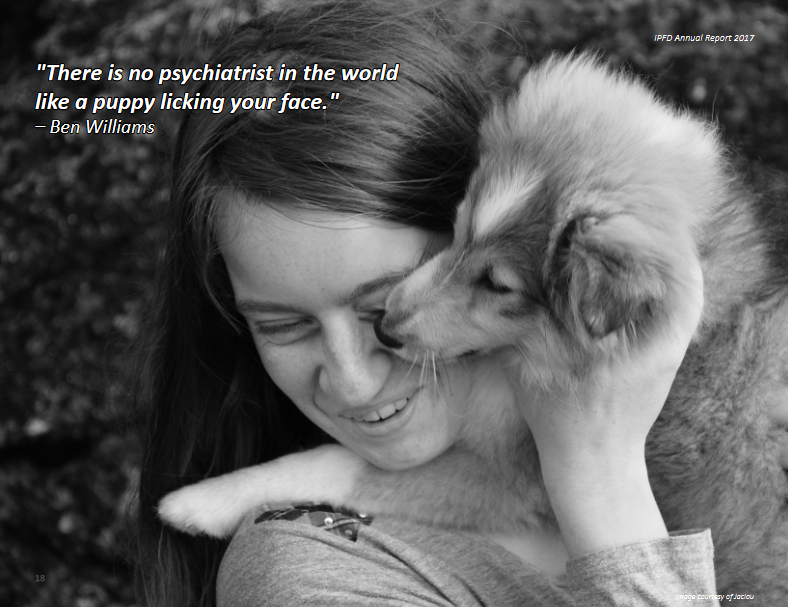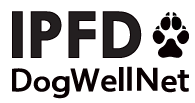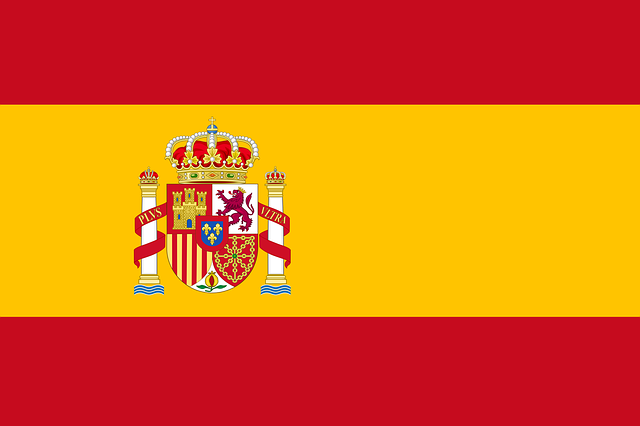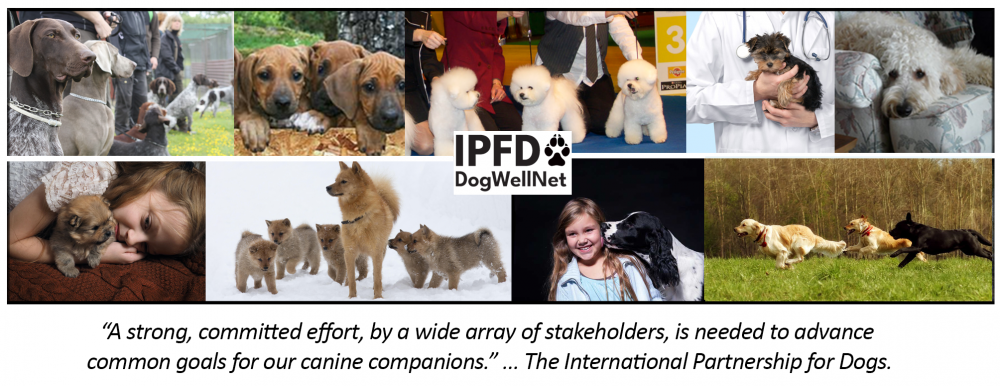Published in September of 2020...
Legislative actions in Europe have provoked intense, confrontational responses within the pedigree dog community. Many within the dog show world see regulatory actions as attacks on their community and on all pedigree dogs, beyond the direct focus on brachycephalic (flat-faced) breeds. Some government actions have been instituted somewhat unilaterally, without wide enough consultation; no doubt political agendas are involved. In some cases, stakeholder groups have welcomed any action as better than none, perhaps without clear evidence that they will effectively address broader concerns. However, many people who are committed to pedigree dogs as an integral and beneficial part of society see that there are problems in certain breeds that need to be addressed. Emotionally charged in-fighting or proclamations of being ‘at war’ with others weaken collective efforts to support the health and welfare of dogs in a meaningful way that is in line with the demands of society. All stakeholders have contributed in some way to the current situation; all have a role and responsibility to contribute to solutions.

This article reviews actions and attitudes that influence ongoing developments relative to pedigree dogs. It is a call for open, respectful discussions, within and across stakeholder groups (e.g. dog show enthusiasts, kennel and breed clubs, legislators, dog owners, veterinary and welfare groups), as well as countries and regions. It is a call for everyone to examine how our personal biases, attachments, and beliefs affect these discussions; and a call to work together for what is truly in the best interest of dogs and the people who care for them.
Examining differences in attitudes and perceptions between some in the pedigree/show world and the wider public, and questioning how these have affected discussions, may encourage thoughtful reflection and fruitful collaboration:
-
Would the discussions benefit from separating concerns for ‘the dogs’ from the people and their dog culture, hobby, and history? The two may be intimately linked in the minds and hearts of many in the show world, but they are likely very distinct for those outside the ‘fancy’. Many may feel that personal desires of those in the pedigree dog world, in terms of their culture and the human side of the equation, should take a back seat to concerns for dog health and welfare.
-
Who has a say in breed health and welfare? The show world may argue that the privilege to define any changes to breeds is theirs alone. However, the public increasingly feels they have right and a responsibility to address health, well-being, and welfare, and social media provides a platform. The show community’s demand to maintain traditional aspects of breeds may be weakened when some are selective when choosing the timeframe for that ‘tradition’. And, especially, when there is an admission that, for some breeds, the original appearance/character is unacceptable to those in the show world today.
-
When does change need to happen? Breeders may feel improvements over 20 to 30 years is satisfactory. But, increased societal awareness of and intolerance for welfare problems in dogs and impending legislation make it clear that timeframe is not widely acceptable. For many members of the public, including many owners of pedigree dogs, the challenges and need for change are obvious and urgent.
-
Breeds are seen as unique in the show ring; how are they viewed in terms of health and welfare issues? Claims that all breeds are problem-free, and a failure to accept responsibility for issues that have arisen through breeding and selection, is counter-productive for open discussions; it may be seen as protectionism. Demanding an all-for-one approach may give rise to the concept that: “Okay, there is clear evidence they are not all ’fine’, so then perhaps they are all bad.” The fallout from current developments will not be limited to brachycephalic breeds.
- Why are we seeing a surge in legislation about pedigree dogs, health, and breeding in many countries? If the perception is that the show world has failed to adequately safeguard the dogs/breeds under their care, failed to take proactive leadership in addressing problems, in the show ring or in breeding, it is not surprising that legislation is then proposed and enforced. On the other hand, if legislators or others focus too narrowly on the role of the pedigree community, and fail to address the bigger picture, including wider sources of dogs, then political actions will not achieve desired outcomes. Unintended consequences may occur if the role of the consumer in creating the demand for challenged breeds or types is not addressed, as well as promotion or normalization of these dogs by the media, pet industry, veterinarians, or others. And of course, all solutions should be based on clear evidence for their effectiveness. All stakeholders need to understand that these are complex challenges involving not only dogs but also human attitudes, attachments, and emotions, on all sides of the question, and there will not be simple solutions. Research has shown that many aspects of the human-dog bond are driven by ‘breed’ and different types of dogs provide richness and benefit to our world. A diversity of breeds needs to be preserved, but good health and welfare are key.
-
Is there a lack of a unified approach? Fortunately, some individuals and breed and kennel clubs are undertaking health and breeding strategies. They often consider breed standards, history, and tradition, but they give the health and welfare of dogs and the long-term sustainability of breeds top priority. Unfortunately, these proactive clubs and individuals may experience resistance, or even backlash, from some members or others.
-
How do we address global concerns, while respecting local differences? Despite a globally increasing ‘love of dogs’, there is no one acceptable standard for dog welfare. In some countries, dogs have legal status as sentient beings, with accompanying rights; elsewhere, dogs are still viewed as possessions or commodities. There is great variation in terms of societal attitudes and oversight on production of dogs, definitions of responsible breeding, and limits to which individuals can define their own goals for breeding or treatment of dogs. Kennel clubs are generally under statutory control within their country and must uphold the ‘laws of the land’ before attending to the guidelines of other organizations to which they belong. Respect for diverse local factors should be foremost in international discussions for collective actions. There are organizations and individuals whose views are at the farthest ends of the spectrum in terms of dog welfare, and they may be unwilling to participate collaboratively. It is to be hoped that the majority share many concerns and that there is considerable common ground in the pursuit of what is best for both dogs and people. This article is a call to the majority to take the lead.
Summary
Rigid attachment to the status quo of the show world or denial of pressing issues in specific breeds will not protect pedigree dogs; it may in fact create problems for them. Claiming that all those who support substantive efforts to improve health and welfare are ‘animal rights activists’ is simply wrong; many understand this is the only way to truly safeguard the future of pedigree dogs. Legislators or others who act unilaterally may not represent the best interests of dogs or the people who care for them. Issues are truly international, complex, and deeply impacted by human-animal interactions. It is time to ‘think globally, act locally’.
There are no quick and easy solutions. IPFD is working with collaborators to help create a roadmap to engage all stakeholders. Those deeply committed to ensuring the survival of all that is good about pedigree dogs need to participate in open and respectful dialogue to identify actions for the benefit of all dogs and people. Each of us should honestly consider how our own attitudes, and our actions – or inaction – have contributed to the current situation. And then, together, let us find a positive way forward.

For the love of dogs, and everyone who loves dogs, please get involved!
Follow developments and find further resources on DogWellNet.com.
Download PDF versions of this article - Note: IPFD does not guarantee the accuracy of translations; please refer to the English version to clarify any discrepancies:
 English Reframing Challenges for Pedigree Dogs_Towards Collective Actions 17Sept2020_English.pdf
English Reframing Challenges for Pedigree Dogs_Towards Collective Actions 17Sept2020_English.pdf
 German/Deutsch Neuausrichtung in Anbetracht aktueller Herausforderungen in der Rassehundezucht.pdf
German/Deutsch Neuausrichtung in Anbetracht aktueller Herausforderungen in der Rassehundezucht.pdf
 French/Française Remettre en contexte les challenges actuels concernant les chiens de race.pdf
French/Française Remettre en contexte les challenges actuels concernant les chiens de race.pdf
 Spanish/Española Redefiniendo los desafíos actuales en torno a los perros de pedigrí.pdf
Spanish/Española Redefiniendo los desafíos actuales en torno a los perros de pedigrí.pdf
 Dutch/Nederlands Rashondenproblematiek samen naar een nieuwe aanpak.pdf
Dutch/Nederlands Rashondenproblematiek samen naar een nieuwe aanpak.pdf
 Finnish/Suomi Rotukoiria ympäröivät haasteet arvioitava uudelleen.pdf
Finnish/Suomi Rotukoiria ympäröivät haasteet arvioitava uudelleen.pdf
Press Release (English, German, Spanish, Dutch, Finnish): International Partnership for Dogs Calls for Collective Actions for Health and Welfare of Pedigree Dogs




Recommended Comments
Join the conversation
You can post now and register later. If you have an account, sign in now to post with your account.
Note: Your post will require moderator approval before it will be visible.